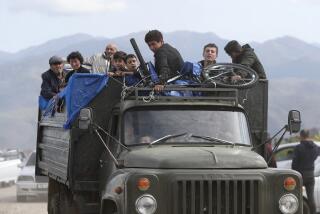Kyrgyz Protesters Burn a Police Building
- Share via
MOSCOW — Protesters rallying against President Askar A. Akayev burned down police headquarters Sunday in the southern Kyrgyzstan city of Jalal-Abad, raising tensions in a country considered key to U.S. hopes for democracy in Central Asia.
The attack on the police building came in response to predawn action Sunday by special police units who briefly took back control of a regional administration office that had been occupied by demonstrators since early March. A crowd estimated at 20,000 recaptured the governor’s office and then marched on the police building, freeing protesters detained there and setting it on fire, witnesses said.
Protesters also briefly took over the airport and used trucks to dump soil and gravel on its runway, in an effort to prevent the government from flying in security reinforcements. The protesters believed that the police who drove demonstrators out of the governor’s office Sunday morning had been flown in from Bishkek, the capital.
Most observers said they did not know about any deaths in the clashes, and presidential spokesman Abdil Seghizbayev said there were none. But the Russian news agency Interfax, in a brief report quoting an anonymous police source, said up to 10 people may have died. Reuters news agency quoted an anonymous police official in Bishkek as saying four policemen in Jalal-Abad had been beaten to death by protesters.
“The rioters are armed only with sticks. I didn’t see any firearms,” Chulpan Ergesheva, head of the Jalal-Abad office of the Coalition for Democracy and Civil Society, a human rights group, said in a telephone interview. “But the people are very edgy, very irritated and angry.... I am afraid if troops arrive in the city that may result in big-scale bloodshed.”
This morning, a crowd of protesters stormed a regional administration building in Osh, about 35 miles south of Jalal-Abad, said Aziza Abdirasulova, a monitor in the city for Freedom House, a U.S.-based organization that promotes democracy. The Russian news agency Interfax reported that police had refrained from using force to avoid causing casualties.
Akayev, 60, who has been president since 1990, has pledged to step down this year as required by the constitution. His departure could set an important example for a democratic transfer of power in a region known for strongman rule. His opponents fear that he plans to remain in power by amending the constitution or holding a referendum to secure another five-year term.
The current crisis was triggered by opposition claims that many of its candidates had been cheated of victory in parliamentary elections Feb. 27 and March 13. The official results gave Akayev overwhelming control of the parliament in this poor and mountainous former Soviet republic of 5 million people.
The protesters are demanding “the resignation of president Akayev, the annulment of the results of the parliamentary election, the holding of new presidential and parliamentary elections and the freeing of all those who were arrested this morning,” Ergesheva said.
Nurvaze Mamatov, a member of the opposition leadership, said by telephone that protesters were still in the city’s central square. “We are the only authority existing now in the Jalal-Abad region,” he said. “We will wait until someone from the government comes and negotiates our demands with us.”
The protesters “don’t want to use violence,” he added.
“This is a peaceful protest of people who didn’t want to put up with the injustice done to them during the election, when the real results were stolen from the people,” he said.
Both critics and supporters of Akayev see the growing protests as modeled after peaceful uprisings in Georgia two years ago and in Ukraine last year that forced out governments accused of electoral fraud.
In Washington, the State Department issued a statement urging talks to achieve a peaceful resolution.
“We are concerned by incidents of violence in Jalal-Abad and other parts of the country,” the statement said. “We call on all parties in Kyrgyzstan to engage in dialogue and resolve differences peacefully and according to the rule of law.”
Kyrgyz presidential spokesman Seghizbayev said the government was “now looking for ways for its local representatives to hold talks with the leaders of the protesters.” The presidential aide stressed that police had been ordered to shoot only into the air. “These orders were obeyed,” he said.
Opposition leader Kurmanbek Bakiyev, a former premier who heads the People’s Movement of Kyrgyzstan, said that “what we see now spreading fast across Kyrgyzstan is the people’s revolution.”
Bakiyev said the opposition had taken control of four regions from the government: Jalal-Abad, Osh, Talas and Naryn.
“That goes to show that people of Kyrgyzstan are fed up with the ruinous policy of President Akayev,” he said.
Seghizbayev said: “At this point, all of it very much reminds one of the scenario played out in Georgia and Ukraine. But these tactics will not succeed in Kyrgyzstan.”
Times staff writer Sergei L. Loiko contributed to this report.
More to Read
Sign up for Essential California
The most important California stories and recommendations in your inbox every morning.
You may occasionally receive promotional content from the Los Angeles Times.










